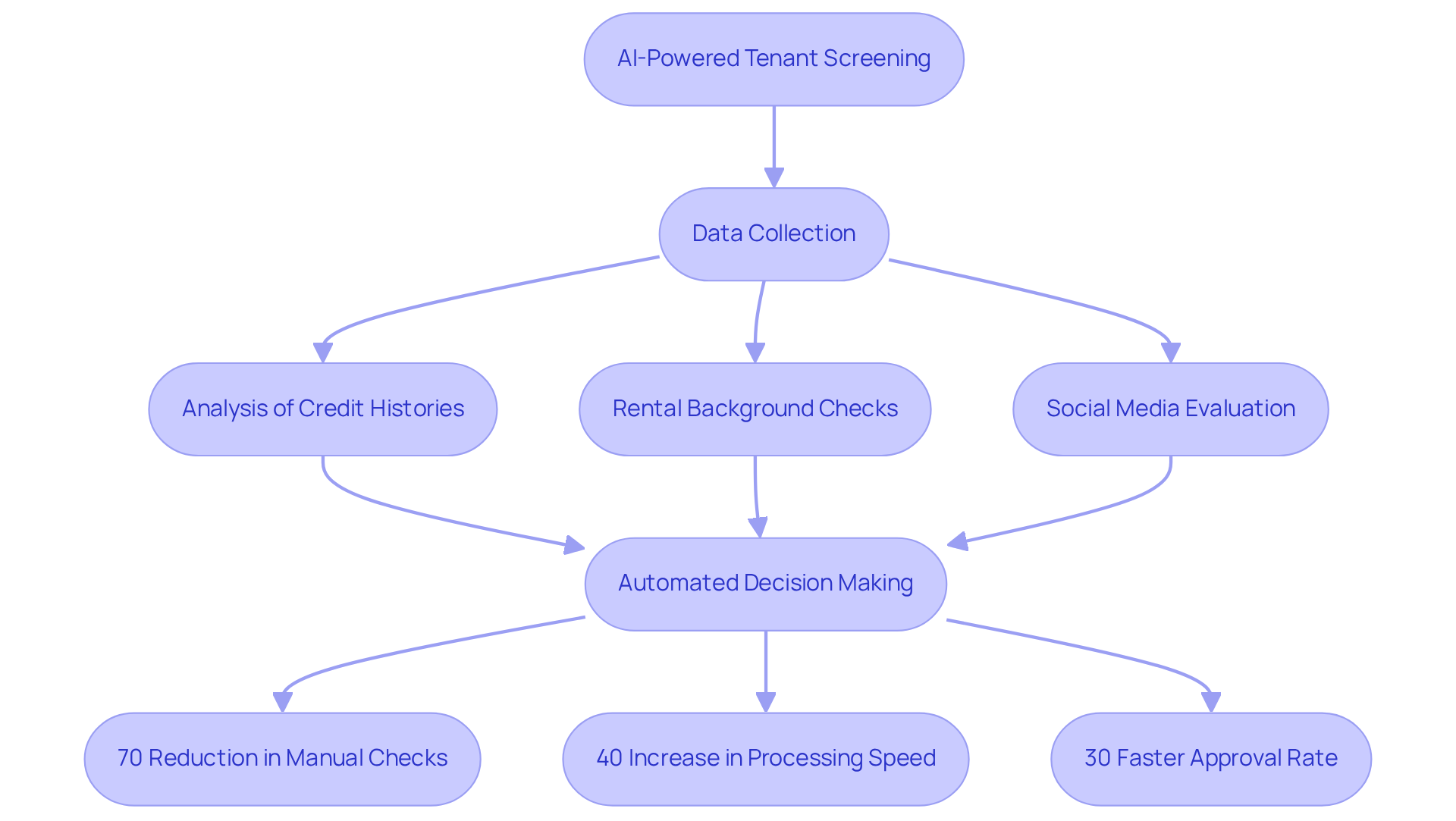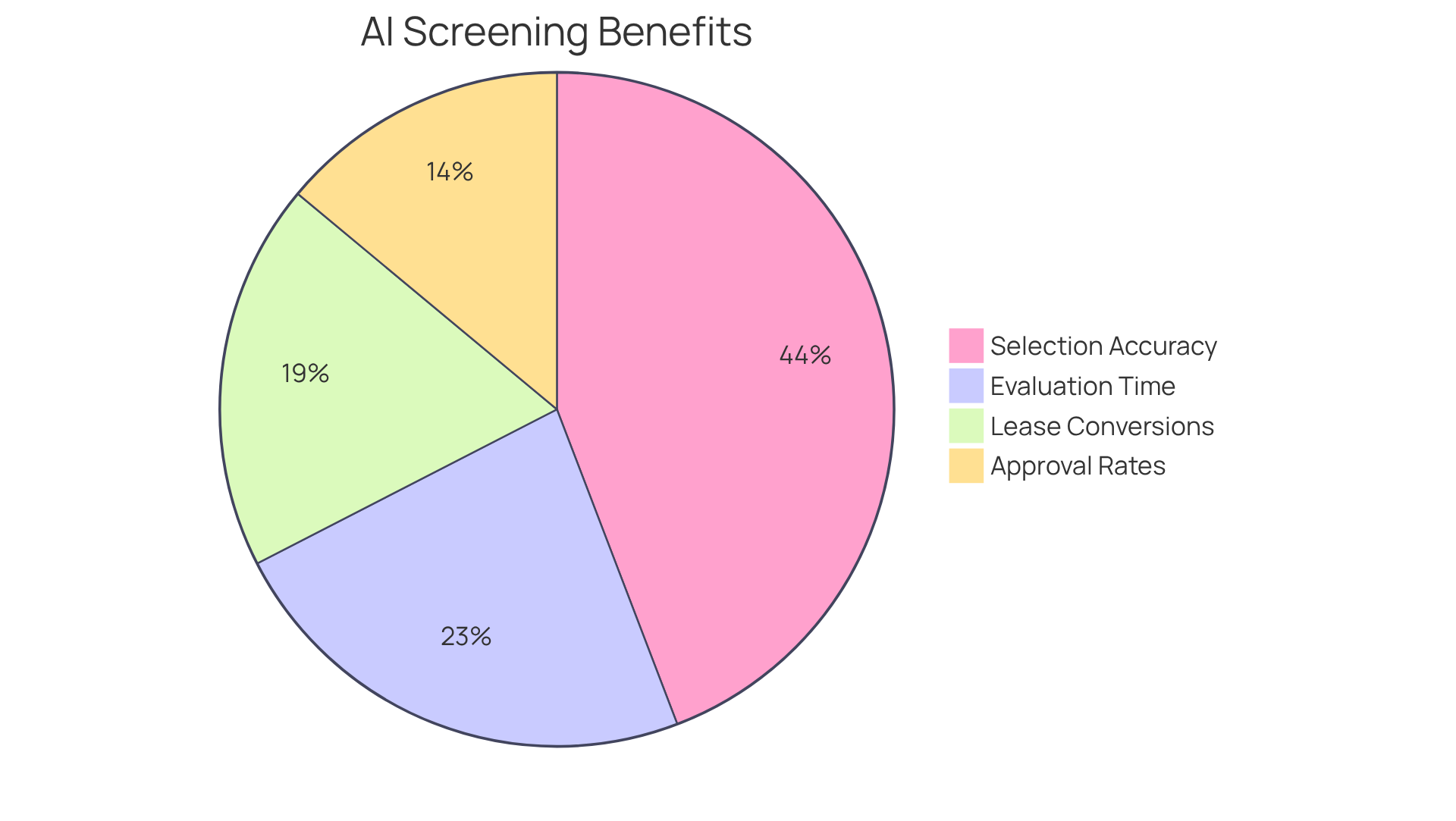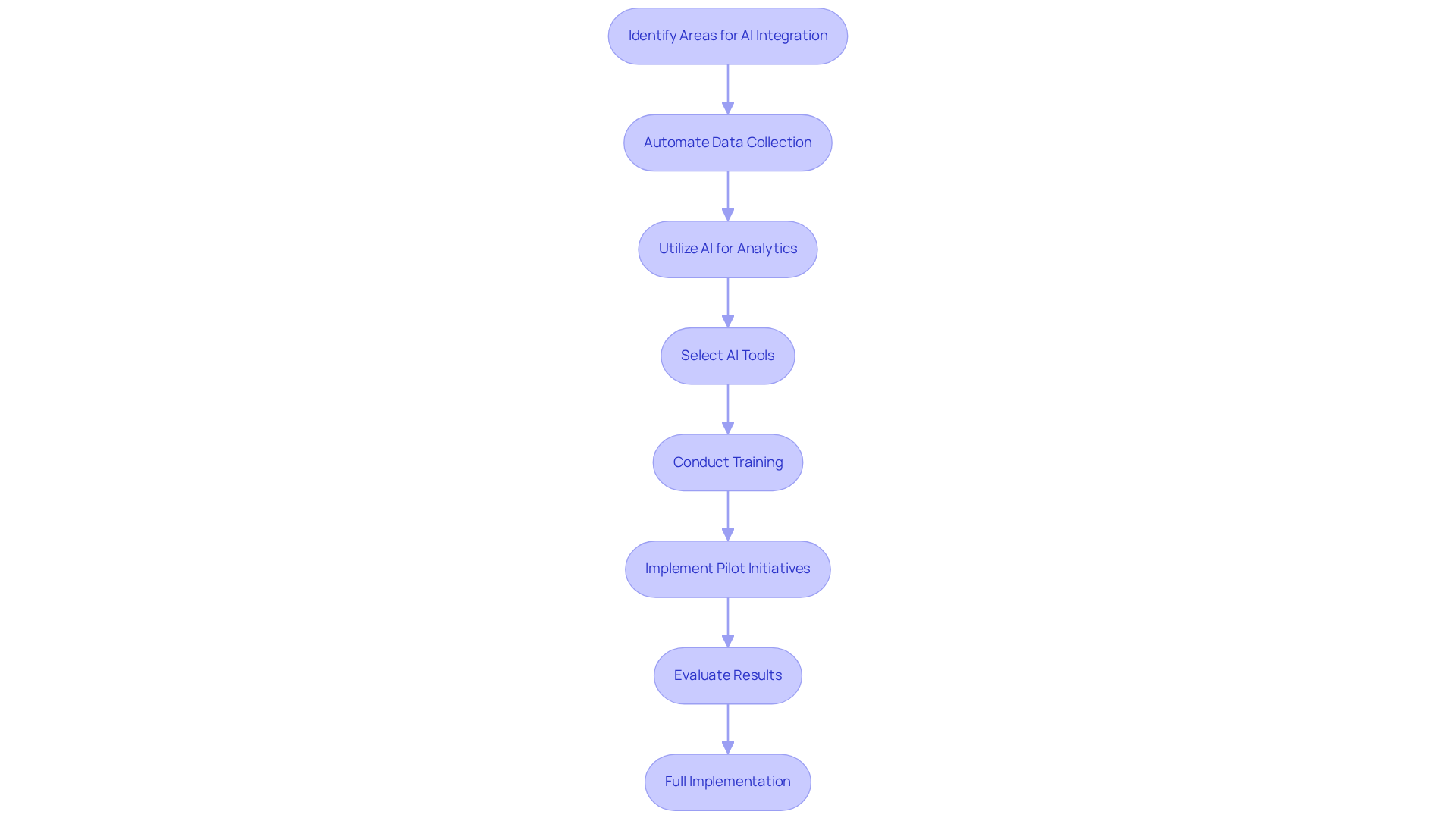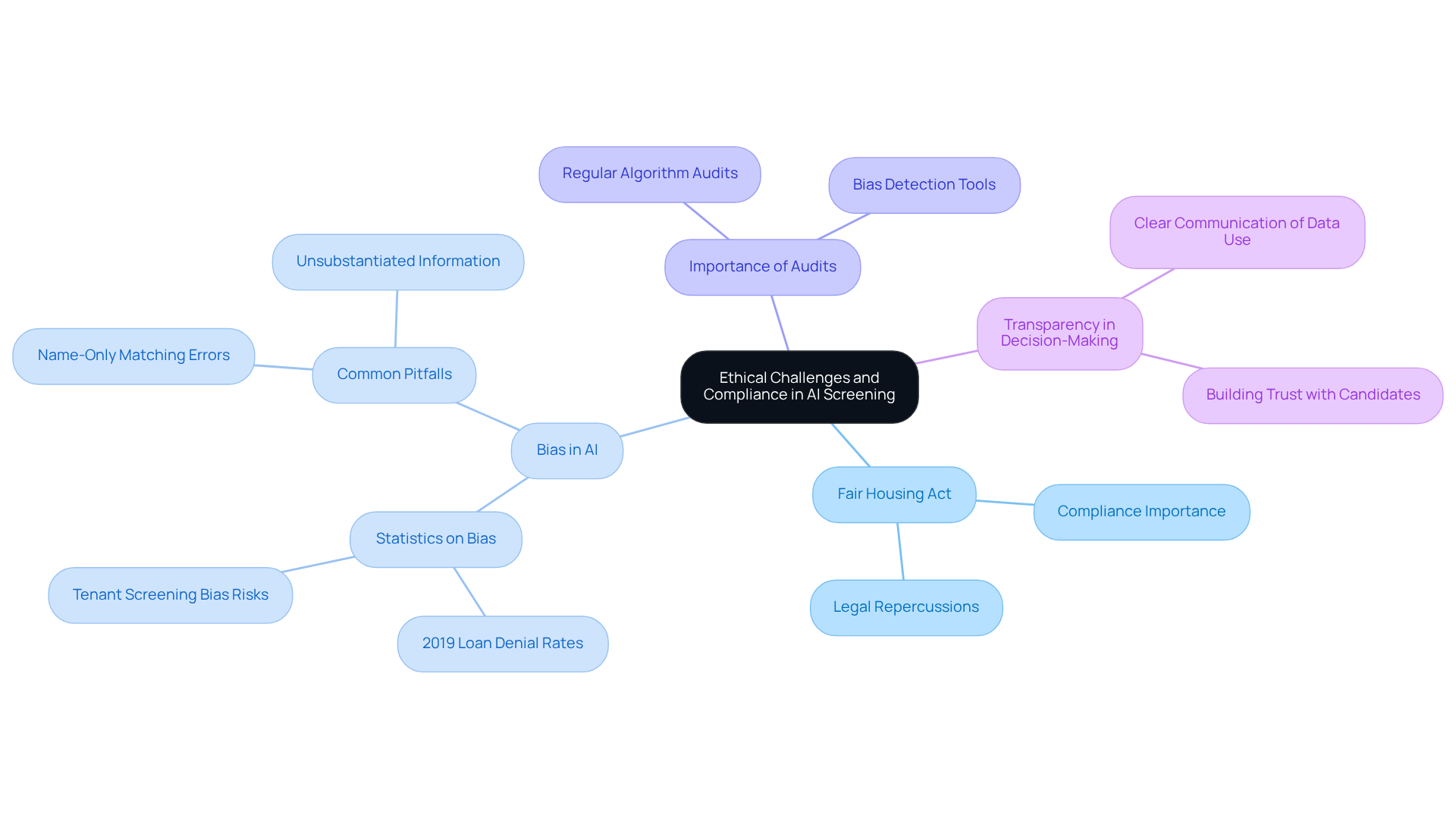Overview
Best practices for effectively utilizing AI in tenant screening involve:
- Automating data collection
- Employing advanced analytics
- Ensuring compliance with fair housing regulations
These strategies significantly enhance the efficiency and accuracy of the screening process. The article underscores this by illustrating the substantial reductions in processing times and improvements in decision-making precision achieved through AI. Furthermore, it emphasizes the critical importance of ethical considerations to prevent bias and discrimination in tenant evaluations.
Introduction
The integration of artificial intelligence into tenant screening is revolutionizing the real estate industry, ushering in a new era of efficiency and accuracy. By leveraging advanced algorithms to analyze vast datasets, property managers can streamline their evaluation processes, drastically reducing the time spent on manual checks while enhancing the reliability of their assessments.
Furthermore, as this technology becomes more prevalent, questions arise about the ethical implications and potential biases embedded within AI systems. How can real estate professionals harness the power of AI while ensuring compliance and fairness in their tenant selection processes?
Understand AI-Powered Tenant Screening
The process of AI for tenant screening utilizes advanced algorithms and machine learning techniques to analyze extensive data sets related to potential residents. This innovative technology evaluates credit histories, rental backgrounds, and even social media interactions, providing a thorough insight into an individual's reliability.
By using AI for tenant screening to automate data collection and analysis, the time spent on manual checks can be reduced by as much as 70%, thereby improving the accuracy of resident assessments. For example, companies such as Rentwell have documented a 40% increase in application processing speed following AI implementation, while Green Residential has achieved a 30% faster approval rate for qualified candidates.
These advancements empower real estate professionals to make informed decisions based on data-driven insights, including the use of AI for tenant screening, moving away from traditional, often labor-intensive methods prone to human error. Furthermore, the use of AI for tenant screening aids landlords in complying with fair housing regulations by utilizing data-driven strategies, identifying potential issues, and minimizing bias in occupant selection.
As technology continues to evolve, its integration into resident evaluation processes is expected to yield even greater efficiencies, improved outcomes for property managers, and enhanced resident relationships, ultimately reducing vacancy durations.

Leverage AI for Enhanced Efficiency and Accuracy
Utilizing AI for tenant screening significantly enhances both efficiency and accuracy. Advanced algorithms utilizing AI for tenant screening swiftly analyze applicant data against predefined criteria, identifying potential red flags that warrant further scrutiny. This rapid analysis not only accelerates the evaluation process but also minimizes the risk of overlooking essential information.
For instance, property management companies that have embraced AI technologies report a reduction in renter evaluation time by as much as 50%, enabling teams to concentrate on other critical property management duties. Furthermore, automated evaluation reduces property manager decision time by 50%, further reinforcing the claim of enhanced efficiency.
The use of AI for tenant screening allows for the continuous improvement of decision-making skills by learning from past data, leading to greater precision in resident selection and reduced turnover rates. In fact, AI for tenant screening has been shown to enhance selection precision by over 95%, with contemporary systems achieving accuracy rates exceeding 95% in occupant evaluation choices.
Additionally, AI-driven occupant selection has been noted to improve lease conversions by 40%, ensuring that property owners can make informed decisions that align with their operational objectives. A significant case study from Green Residential highlights these advantages, demonstrating a 30% increase in approval rates for qualified applicants through the use of AI for tenant screening.

Integrate AI into Existing Tenant Screening Processes
To effectively integrate AI into tenant evaluation processes, real estate professionals must first identify specific areas where AI can enhance operations. This includes:
- Automating data collection from applications
- Utilizing AI-driven analytics to refine background checks
- Selecting AI tools that seamlessly interface with existing property management software
Comprehensive training sessions for staff are essential to mitigate resistance to change and maximize the technology's potential.
Successful case studies demonstrate that a phased strategy, beginning with pilot initiatives, promotes better adoption and yields measurable enhancements in assessment results. For instance, a major property management firm reported a 40% decrease in vacancy rates after implementing AI-driven tenant evaluation solutions. Additionally, the use of AI for tenant screening has been shown to reduce approval times from weeks to hours, showcasing the effectiveness of these technologies in optimizing tenant selection and retention.

Navigate Ethical Challenges and Compliance in AI Screening
Navigating ethical challenges and compliance in AI evaluation requires a comprehensive understanding of laws such as the Fair Housing Act. Real estate experts must ensure their AI systems do not unintentionally introduce bias or discrimination into the evaluation process. A 2023 report revealed that programs utilizing AI for tenant screening often contain unsubstantiated information, leading to unfair outcomes. This finding aligns with a 2022 report that highlighted similar issues, underscoring the necessity for regular audits of AI algorithms to identify and mitigate potential biases.
Statistics indicate that in 2019, lenders were 80% more likely to refuse loans to Black individuals compared to similar White individuals, emphasizing the critical importance of adhering to the Fair Housing Act. Clarity in AI decision-making is essential; candidates should be informed about the data used and its influence on their evaluation results. As one expert noted, "AI is powerful, but compliance and fairness are non-negotiable."
By prioritizing ethical considerations and compliance, real estate professionals can build trust with candidates and protect their organizations against legal repercussions, ensuring adherence to the Fair Housing Act while using AI for tenant screening to foster a more equitable evaluation process. Furthermore, common pitfalls in AI screening, such as the risk of error from name-only matching—particularly for minority applicants—should be addressed to prevent the misapplication of these practices.

Conclusion
Incorporating AI into tenant screening signifies a transformative shift in the evaluation of potential residents by real estate professionals. This technology streamlines the assessment process and enhances accuracy, ensuring compliance with fair housing regulations. By leveraging advanced algorithms and machine learning, landlords can make informed decisions while minimizing biases, ultimately fostering a more equitable selection process.
The article underscores several key benefits of using AI in tenant screening, such as:
- Significant reductions in evaluation time
- Improved accuracy in applicant assessments
- Increased lease conversion rates
Case studies illustrate how property management companies have successfully implemented AI solutions, leading to faster approval times and decreased vacancy rates. Furthermore, the emphasis on ethical considerations highlights the importance of maintaining fairness and transparency in AI-driven evaluations.
As the landscape of tenant screening evolves, embracing AI technology is essential for real estate professionals seeking to enhance operational efficiency and decision-making processes. By prioritizing ethical practices and compliance, the industry can build trust with applicants and ensure fair treatment for all. Adopting these best practices not only prepares organizations for the future but also establishes a standard for responsible tenant screening in an increasingly digital world.
Frequently Asked Questions
What is AI-powered tenant screening?
AI-powered tenant screening utilizes advanced algorithms and machine learning techniques to analyze extensive data sets related to potential residents, including credit histories, rental backgrounds, and social media interactions, to assess an individual's reliability.
How much can AI reduce the time spent on tenant screening?
AI can reduce the time spent on manual checks by as much as 70%, improving the accuracy of resident assessments.
What improvements have companies experienced after implementing AI for tenant screening?
Companies like Rentwell have documented a 40% increase in application processing speed, while Green Residential has achieved a 30% faster approval rate for qualified candidates after implementing AI.
How does AI-powered tenant screening help landlords comply with regulations?
AI-powered tenant screening aids landlords in complying with fair housing regulations by utilizing data-driven strategies that identify potential issues and minimize bias in occupant selection.
What are the expected future benefits of integrating AI into tenant screening processes?
The integration of AI into resident evaluation processes is expected to yield greater efficiencies, improved outcomes for property managers, and enhanced resident relationships, ultimately reducing vacancy durations.




